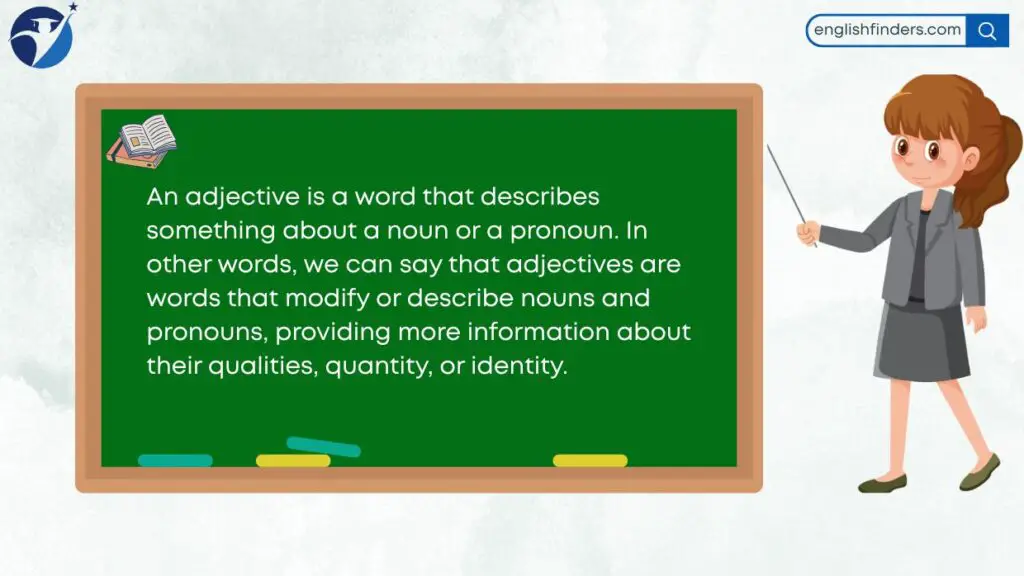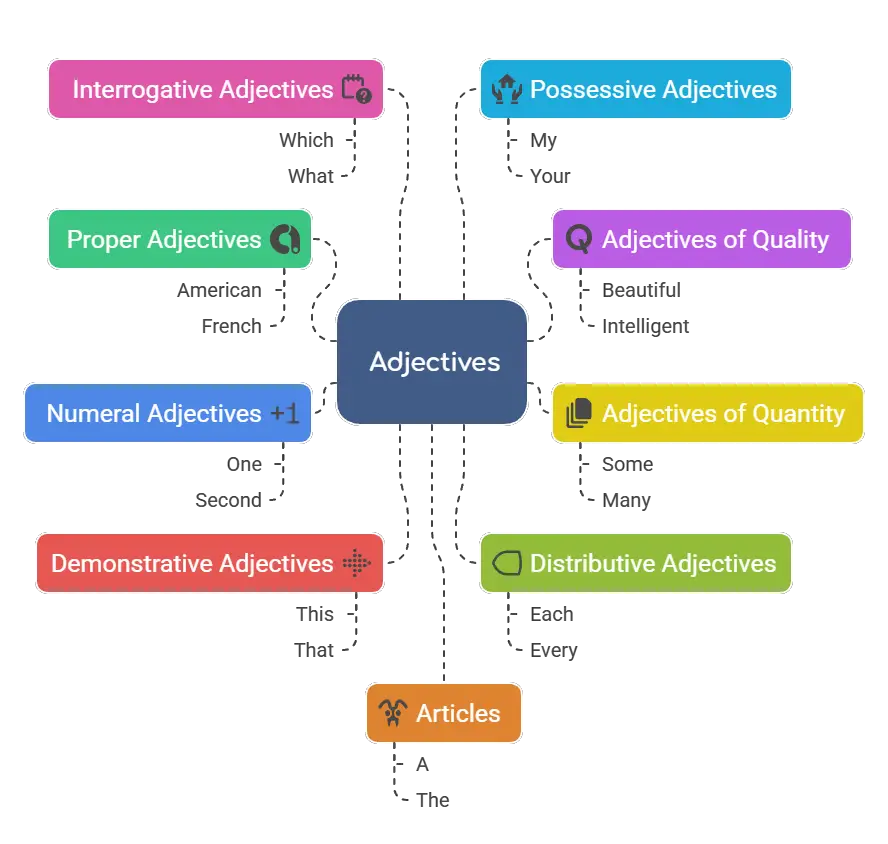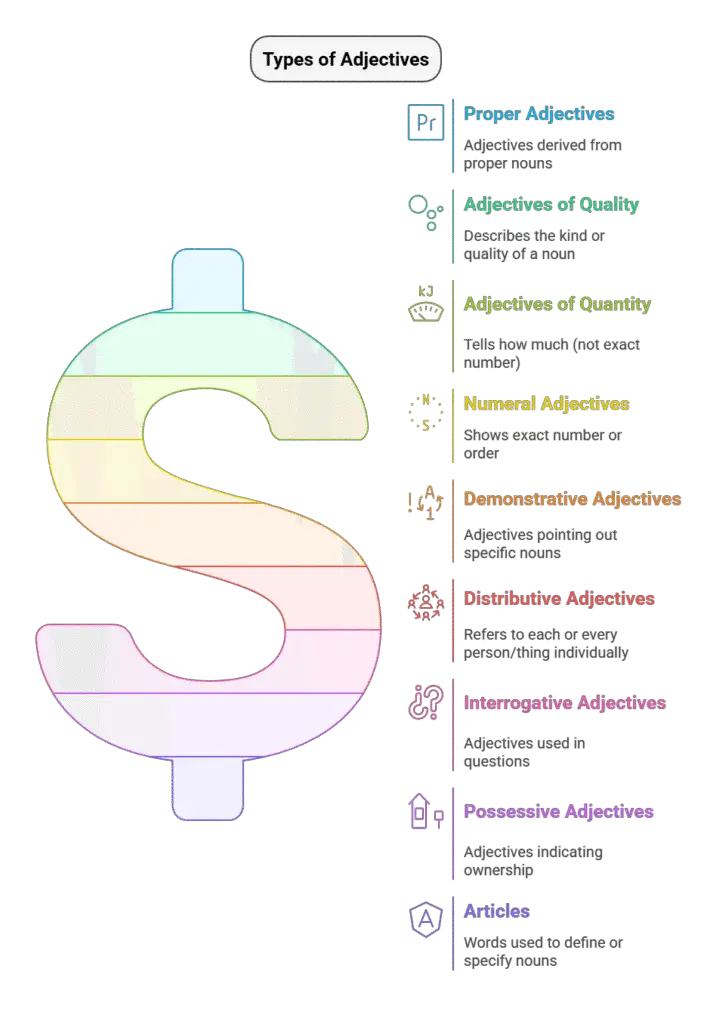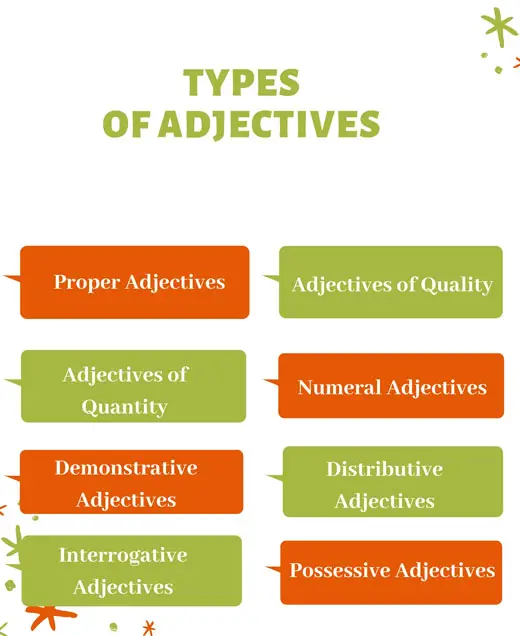Last updated on June 19th, 2025 at 11:52 am
The Adjective is an exciting lesson in English grammar. Do you know why? Because it can modify the other words of the parts of speech or change the meaning of the whole sentence. Adjectives are usually words that depict the qualities of nouns. They add color, depth, and clarity to our sentences by providing more information about the subject. In this lesson, we’ll explore nine different types of adjectives, providing definitions and examples to help you understand how they work and how to use them effectively.
What is an Adjective?
Quick Navigation

An adjective is a word that describes something about a noun or a pronoun. In other words, we can say that adjectives are words that modify or describe nouns and pronouns, providing more information about their qualities, quantity, or identity. For example, in the sentence “He is a handsome boy” the word “handsome” is an adjective because it gives information about the noun. There are many types of adjectives in English grammar, and let us see the opinions of the scholars regarding Adjectives in English.
J.C. Nesfield: An Adjective is a word used for qualifying (or adding something to) the meaning of a noun or pronoun.
Wren and Martin: An Adjective is a word used to add something to the meaning of a noun.
Now we can say an Adjective is a word that usually describes a noun or a pronoun and in some cases, other adjectives. Let us see some examples:
Adjectives are marked in bold for easy identification:
- He is over-ambitious about the matter.
- She was more famous than she is now.
- The boy is so clever.
- He is good at English.
- Would you please give me one hundred dollars?
- The doll looks so beautiful.
- Would you please make some delicious food?
- Mr. Adam is faithful enough to his wife.
- The baby seems attractive.
- I’m happy to see my final examination result.
- It was an incredible journey.
- He is thankful to his friend for solving the problem.
Note: Every Adjective in the above sentences modifies the nouns and pronouns.
Types of Adjectives in English
There are nine types of Adjectives in English grammar. They are:

- Proper Adjectives
- Adjectives of Quality
- Adjectives of Quantity
- Numeral Adjectives
- Demonstrative Adjectives
- Distributive Adjectives
- Interrogative Adjectives
- Possessive Adjectives
- Articles

1. Proper Adjectives
You have already heard about Proper nouns, and proper Adjectives are related to proper nouns. Do you know why? Because Proper Nouns are the names of any person, country, city, day, etc. Proper Adjectives are the adjective form of Proper nouns.
For example: ‘America’ is a Proper noun, but ‘American’ is a Proper Adjective. Similarly, Shakespeare is a Proper Noun, but Shakespearean is a Proper Adjective.
Some examples of proper adjectives are given below. Proper adjectives are marked as bold for easy identification:
- I love Bangladeshi people.
- They met a Japanese company.
- He is reading a Shakespearean comedy.
- She needs a Korean friend.
- The older man visits the Christian Church.
2. Adjectives of Quality
An adjective that expresses the nature of a noun or expresses the shape, size, and color of a person, place, or thing is called an adjective of quality.
For example; He is a handsome boy. Here ‘handsome’ is an adjective of quality because it describes the quality or shape of the person.
Some examples of the adjectives of quality are given below: Adjectives of quality are marked in bold for easy identification:
- I see a group of beautiful birds flying in the sky.
- She always loves pink color.
- He is tall enough to join the Army.
- They are too clever to defeat their enemies.
- You look so gorgeous.
3. Adjectives of Quantity
An adjective used to indicate the amount or estimated amount of a noun or a pronoun is called an adjective of quality. For example, I don’t have enough money to buy a car, and here enough is an adjective of quantity.
Some examples of adjectives of quantity are given below: Adjectives of quantity are marked in bold for easy identification:
- I had many friends in my school life.
- He sold his bike, got some money, and rented an apartment.
- It would be best if you had much hard work to achieve success.
- A few people can reach their destination.
- Most of the boys were absent from the class.
4. Numeral Adjectives
An adjective that describes the number of a noun or pronoun is called a numeral adjective. In short, the words indicating numbers are considered numeral adjectives. These adjectives indicate the quantity, order, and position of nouns.
For example; He has remained in the first position in the class for many years. Here ‘first’ is the numeral adjective because it states the number of ranks of the person.
Some examples of adjectives of quantity are given below: Numeral adjectives are marked as bold for easy identification:
- We are three friends playing on the field.
- He is the last person to attend the meeting.
Numeral adjectives are of three kinds. They are:
- Definite Numeral Adjectives
- Indefinite Numeral Adjectives
- Distributive Numeral Adjectives
Definite Numeral Adjectives
Definite numeral adjectives are those types of adjectives that describe the exact number of people or things. Definite numeral adjectives are a set of cardinal and ordinal numbers. For example:
| Cardinal numbers | Ordinal numbers |
| One | First |
| Two | Second |
| Three | Third |
| Four | Fourth |
| Five | Fifth |
| Six | Sixth |
| Ten | Tenth |
| Etc. | Etc. |
Definite numeral adjectives are marked in bold for easy identification.
- He is the first boy in the class.
- I’m the second person to enter the room.
- She reads in class ten right now.
- The boy and his two friends reached the campus.
- Nova claimed the third position in the recent ranking of the sports event.
Indefinite Numeral Adjectives
Indefinite numeral adjectives are those adjectives that don’t show the exact number in contrast to definite numeral adjectives—for example; Few, many, some, all, most, etc.
Indefinite numeral adjectives are marked in bold for easy identification.
- A few percent of people join the meeting.
- Some of my friends are participating in a football match.
- Most of the students made the same mistake in the examination.
- I have seen many flowers in the garden.
- All of you should follow the code of conduct of the organization.
Distributive Numeral Adjectives
Distributive numeral adjectives are those adjectives that describe a singular noun and a singular verb in a sentence. These adjectives are similar to distributive adjectives. For example, each, every, either, neither, etc.
Distributive numeral adjectives are marked in bold for easy identification.
- Every player on the field plays a good game.
- Please distribute the food to each of them.
- You can choose either road.
- Neither road leads to the village.
5. Demonstrative Adjectives
An adjective that indicates something or someone is called a demonstrative adjective—for example, this, that, these, those, etc.
Demonstrative adjectives are marked in bold for easy identification.
- This book is interesting to read.
- That cake looks so delicious.
- These boys play beautifully.
- Those shoes are made in Bangladesh.
6. Distributive Adjectives
An adjective used to indicate each person or thing individually is called a distributive adjective. For example, any, each, either, neither, etc.
Distributive adjectives are marked in bold for easy identification.
- Do you have any books on English grammar?
- Every child must bring their notebook.
- You can choose either option.
- I liked neither of the movies we watched last night.
7. Interrogative Adjectives
Interrogative adjectives are similar to interrogative pronouns. These types of adjectives are used to ask questions about nouns. Let’s see what an interrogative adjective is.
An adjective that is used to place before a noun and modifies that noun is called an interrogative adjective, for example, which, whose, what, etc.
Interrogative adjectives are marked in bold for easy identification.
- Which clothes did you want to buy?
- Whose book do you prefer most?
- What color is your bike?
- Which writer is your favorite in English poetry?
8. Possessive Adjectives
A possessive adjective is used to place before a noun and modify the noun to demonstrate possession or ownership of a particular person or thing.
In other words, possessive adjectives refer to the ownership of a person, place, or thing—for example, my, your, his, her, our, their, its, etc.
Possessive adjectives are marked in bold for easy identification.
- My parents will arrive here very soon.
- Their garden looks very attractive.
- He forgot to bring his key before he came here.
- The company has assigned new projects to its employees.
- It’s my challenging job to find a solution.
- This is our job to obey our parents.
- It’s your responsibility to finish the program.
9. Articles
Articles are also called adjectives. There are three articles (a, an, the) in English. Articles are classified into two categories. They are:
- Indefinite Articles
- Definite Articles
Indefinite Articles
The article that defines a noun as non-specific is called the indefinite article. In short, ‘a’ and ‘an’ are called indefinite articles. For example:
- I have a laptop.
- This is an apple.
- I want to buy a new bike.
- He is a lazy person.
- She is an M.A.
Definite Articles
The article that defines a noun as specific is called the indefinite article. In short, ‘the’ is called a definite article. For example:
- I see a bird flying in the sky.
- He wants to go to the United States.
- This is the beautiful garden I like most.
- Mr. Khopen decides to tell the story in our class.
- She had the strength to fulfill her dreams.

📚 Summary Table: Types of Adjectives
Here’s a quick and easy-to-read summary of the types of adjectives, along with their definitions and examples:
| Type of Adjective | Definition | Examples |
|---|---|---|
| Proper Adjective | Comes from a proper noun; always capitalized | Italian food, Shakespearean drama |
| Adjective of Quality | Describes the kind or quality of a noun | brave boy, soft pillow |
| Adjective of Quantity | Tells how much (not an exact number) | some sugar, little water |
| Numeral Adjective | Shows the exact number or order | three cats, first place, double shift |
| Demonstrative Adjective | Points out specific nouns | this book, those shoes |
| Distributive Adjective | Refers to each or every person/thing individually | each student, every car |
| Interrogative Adjective | Used with nouns to ask questions | which bag, what game, whose pen |
| Possessive Adjective | Shows ownership or belonging | my dog, her dress, their school |
| Articles (a, an, the) | Used before nouns to show specificity | a bat, an orange, the sun |
How to Identify Different Types of Adjectives in a Sentence
Identifying adjectives in a sentence can sometimes be tricky, but there are a few strategies you can use:
Ask questions: If you can ask, “What kind?” “How many?” “Which one?” or “Whose?” and the word answers that question, it’s likely an adjective.
Look for descriptive words: Adjectives typically describe the noun they accompany.
Check the position: Adjectives usually come before the noun, though sometimes they follow it.
Final Thoughts
Adjectives are powerful words that bring life to our sentences. By now, you’ve learned the most important types of adjectives, including their definitions and examples. From describing qualities to showing quantity, ownership, and even asking questions, adjectives help you express yourself more clearly and creatively.
It is essential to learn Adjectives in a proper and accessible way. This lesson will help you understand the nine adjectives in English grammar, including definitions and examples. However, try to read carefully.
Frequently Asked Questions
What is an Adjective?
An adjective is a word or part of speech that modifies a noun or adds extra information about a noun.
What are the main types of adjectives in English?
The main types of adjectives include: Proper adjectives, Adjectives of Quality, Adjectives of Quantity, Numeral adjectives, Demonstrative adjectives, Distributive adjectives, Interrogative adjectives, Possessive adjectives, and Articles (a, an, the).
What is the difference between descriptive and proper adjectives?
Descriptive adjectives describe a noun’s qualities, while proper adjectives are derived from proper nouns and are capitalized.
How can I avoid common mistakes with adjectives?
To avoid mistakes, ensure you’re not being redundant and that you’re using the correct type of adjective for your sentence.
What are articles, and why are they considered adjectives?
Articles—a, an, and the—are considered a type of adjective because they come before nouns and help define them clearly, just like other adjectives.
📄 Worksheet: Types of Adjectives
🔍 Part 1: Identify the Type of Adjective
Read each sentence carefully. Underline the adjective and write its type (e.g., Proper, Quality, Quantity, Numeral, Demonstrative, Distributive, Interrogative, Possessive, Article).
- I bought a new shirt yesterday.
Adjective: ____________ Type: ______________ - Her bag is on the chair.
Adjective: ____________ Type: ______________ - They planted five trees in the garden.
Adjective: ____________ Type: ______________ - This pencil belongs to me.
Adjective: ____________ Type: ______________ - Do you know which subject comes next?
Adjective: ____________ Type: ______________
🧠 Part 2: Fill in the Blanks with the Correct Adjective Type
Choose the correct adjective based on the clue in brackets.
- She wore a __________ dress to the party. (Descriptive)
- I need __________ sugar to bake a cake. (Quantity)
- __________ student must bring their notebook. (Distributive)
- He is reading __________ novel by Charles Dickens. (Proper)
- I saw __________ elephant at the zoo. (Article)
✨ Part 3: Match the Adjective to Its Type
Draw a line to match each adjective to its correct type.
| Adjective | Type |
|---|---|
| several | a. Possessive Adjective |
| your | b. Numeral Adjective |
| that | c. Demonstrative Adjective |
| second | d. Quantity Adjective |
| much | e. Distributive Adjective |
| each | f. Interrogative Adjective |
| whose | g. Article |
| an | h. Proper Adjective |
| Indian | i. Article of Quality |
✏️ Part 4: Write Your Own Sentences
Use the given adjective types and write one sentence for each.
- Proper Adjective: ______________________________________
- Adjective of Quantity: __________________________________
- Possessive Adjective: ___________________________________
- Interrogative Adjective: _________________________________
- Article: _______________________________________________
✅ Bonus Challenge:
Pick an object near you and describe it using at least three different types of adjectives.
Example: This small red ball is mine.
Your sentence: _______________________________________________
✅ Answer Key (For Teachers or Self-Check)
Part 1: Identify the Type of Adjective
- new – Type: Adjective of Quality
- Her – Type: Possessive Adjective
- five – Type: Numeral Adjective
- This – Type: Demonstrative Adjective
- which – Type: Interrogative Adjective
Part 2: Fill in the Blanks
- beautiful (or any other descriptive word)
- some
- Each
- Victorian (or another proper adjective)
- an
Part 3: Matching
| Adjective | Type |
|---|---|
| several | d. Quantity Adjective |
| your | a. Possessive Adjective |
| that | c. Demonstrative Adjective |
| second | b. Numeral Adjective |
| much | d. Quantity Adjective |
| each | e. Distributive Adjective |
| whose | f. Interrogative Adjective |
| an | g. Article |
| Indian | h. Proper Adjective |
Part 4: Example Answers
(Students’ answers may vary. Here are sample responses.)
- Proper Adjective: I love Chinese noodles.
- Adjective of Quantity: We have enough chairs.
- Possessive Adjective: My cousin is very helpful.
- Interrogative Adjective: Which shirt do you like best?
- Article: I saw a butterfly in the garden.
🌟 Reflection Activity
Take a moment to answer these reflection questions:
📘 1. What is your favorite type of adjective and why?
✍️ ___________________________________________________
🧠 2. Did you find it easy or hard to tell the difference between the types? Why?
✍️ ___________________________________________________
🗣️ 3. Try using 3 different types of adjectives to describe your school, teacher, or pet:
✍️ ___________________________________________________
Adjective Quiz

Azizul Hakim is the founder & CEO of englishfinders.com. He is a passionate writer, English instructor, and content creator. He has completed his graduation and post-graduation in English language and literature.

